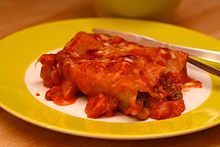- Cannelloni
-
Cannelloni (Italian: large reeds) are a cylindrical type of pasta generally served baked with a filling and covered by a sauce. Some type of cannelloni need to be boiled beforehand, for some others is enough to use runnier sauces/filling. If one cannot find ready made cannelloni, rolling lasagne around a filling is an alternative. The stuffing may include ricotta cheese, spinach and various kinds of meat. The sauces typically used are tomato or béchamel sauce.
Contents
Versions
Cannelloni is often erroneously referred to as manicotti (Italian: sleeves) (English pronunciation: /ˌmænɨˈkɒtiː/), which is actually a filled Italian dinner crepe, as opposed to pre-rolled pasta.[1] While manicotti and cannelloni are sometimes used interchangeably in preparing non-traditional versions of some dishes, in traditional Italian cooking cannelloni are made with pasta and manicotti with a specialized crepe pan, and the two have particular uses. Although both terms are plural nouns in Italian, the English term is often construed as singular, particularly when used as the name of the dish. Also know in foreign countries as "canned bologna"
Traditions
St. Stephen's Day on December 26 is a traditional holiday in Catalonia. It is celebrated right after Christmas, with a feast including canelons. They are stuffed with ground meat from the escudella i carn d'olla, turkey or capon of the previous day (Christmas dinner).
Other uses
The American composer Peter Schickele has called for an uncooked cannelloni tube, which he calls "pastaphone", to be used as a musical instrument (played in the manner of a horn) in works by the fictional composer P. D. Q. Bach.[2]
See also
References
- ^ Herbst, Sharon Tyler (2001). The new food lover's companion. Boston: Barron's Educational Series. ISBN 0-7641-1258-9. OCLC 43894522.[page needed]
- ^ Blau, Eleanor (1998-12-25). "Oh, No! Still More (Quite a Bit More!) From P.D.Q. Bach.". The New York Times. http://query.nytimes.com/gst/fullpage.html?res=950DE1D9153CF936A15751C1A96F948260. Retrieved 2007-12-31.
Categories:
Wikimedia Foundation. 2010.


